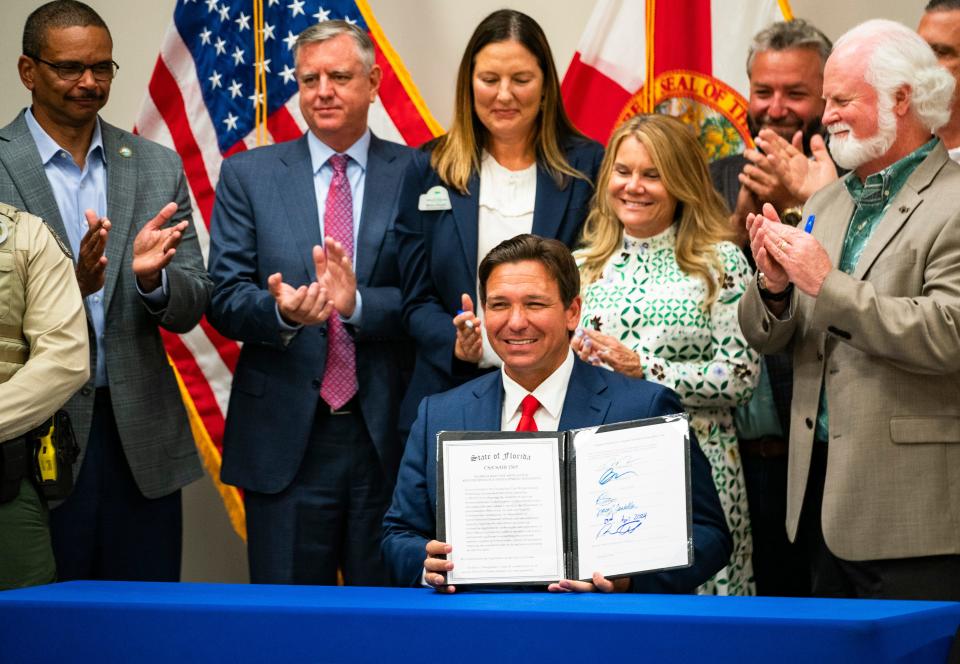Gov. DeSantis signs bill in Naples to continue tech initiative to fight red tide
- Oops!Something went wrong.Please try again later.
At a press event near Naples on Tuesday, Florida Gov. Ron DeSantis signed a bill that will continue a research- and technology-driven initiative to combat the harmful effects of red tide.
He made the announcement at the Naples Botanical Garden, before putting his pen to it.
The initiative is a public-private partnership between the Florida Fish and Wildlife Conservation Commission and the Mote Marine Laboratory in Sarasota.
Established by the state in 2019, the program was set to expire on June 30, 2025. The bill will allow it to continue indefinitely.
The purpose of the initiative is to "develop, test, and implement innovative, effective and environmentally sustainable technologies and approaches" to address red tide.

According to a summary analysis for the bill, program funding has allowed Mote to "examine more than 300 chemicals and compounds," and to develop research projects that are ready for field testing.
The governor noted that millions had already been invested in the initiative. The state has funded it at $3 million a year since its inception, with money from the general fund.
"We think this is something that is a notable effort," DeSantis said.
He stressed that "you can't just be dumping things" into the Gulf of Mexico, or other coastal waters, to try to control the spread of red tide to Florida's coastline because there could be negative effects, so research and testing are critical to avoid more harm.
"Sometimes, the side effects can be worse," DeSantis said. "Of course, you don't want to do that."
DeSantis acknowledged red tide isn't something that can be eliminated because it's naturally occurring and there isn't an "off switch."

However, he emphasized there is promise in new research and technology that could reduce its spread and clean it up faster, which has the potential to reduce both the environmental and economic impacts.
Red tide can kill fish and other sea life and cause respiratory problems for humans.
More: How safe is it to eat seafood during red tide in Southwest Florida? What to know
And: Kimberly's Reef coming together as FGCU creates underwater field laboratory
DeSantis referred back to the devastating blooms in 2018 that led then-Gov. Rick Scott to issue executive orders declaring a state of emergency in 14 counties, including Collier and Lee.
According to the bill summary, it took several years for fish stocks to rebound from Anna Maria Island near Tampa Bay south to Ten Thousand Islands. Economic losses to the state's tourism sector were estimated at about $184 million back then.
A study commissioned by the Conservancy of Southwest Florida, Sanibel-Captiva ConservationFoundation and Captains for Clean Water found if what happened in 2018 occurred in 2024 or 2025 it could be even more costly.
The bill requires Mote Marine to develop recommendations for field trial deployment in state waters of promising science-based technologies, and to submit its findings to state agencies, including the Department of Environmental Protection, the Fish and Wildlife Conservation Commission, and the Department of Agriculture and Consumer Services.

DEP would work with Mote to deploy and test the technologies, and to expedite regulatory reviews for the recurring use of successful ones.
The extension of the research and technology initiative isn't the only way Florida is trying to minimize the impacts of algae blooms in the state.
While DeSantis hasn't signed off on next year's budget yet, he said he'll support additional spending that will bring the state's investments in red tide and blue-green algae management and mitigation to more than $125 million since he became governor in January 2019.
"That's a big investment," he said.
During the news conference, DeSantis also highlighted another $100 million in funding for the Florida Wildlife Corridor, through a bill he signed earlier this month.
The Florida Wildlife Corridor, established in 2021, encompasses nearly 18 million acres of land. Ten million acres are protected conservation lands, including state parks, state forests, and family farms.
The corridor, designed to protect wildlife through connected waters and lands, includes parts of Southwest Florida.
"Outdoor recreation in the state of Florida generates over $52 billion in economic output, and our Florida state parks alone have an economic impact of $3.6 billion, and it supports more than 50,000 jobs total," DeSantis said. "So, this is significant. We understand how important it is to the lifeblood of the state."
DeSantis has also directed the Florida Department of Transportation to continue its efforts to install wildlife crossings along the state’s roadways, which can help provide safe passage for animals, such as the endangered Florida panther.

Shawn Hamilton, secretary of the Florida Department of Environmental Protection, described DeSantis as America's conservation governor.
“It’s important to make steady gains towards protecting and conserving irreplaceable natural resources – not just for today, but forever,” he said. "Florida has a long history as a national leader in conservation, which is vital to environmental protection and economic growth, and our pace has only accelerated thanks to the governor’s bold vision and the continued support of the Legislature.”
This article originally appeared on Naples Daily News: DeSantis stops in Naples to sign bill aimed at controlling red tide

